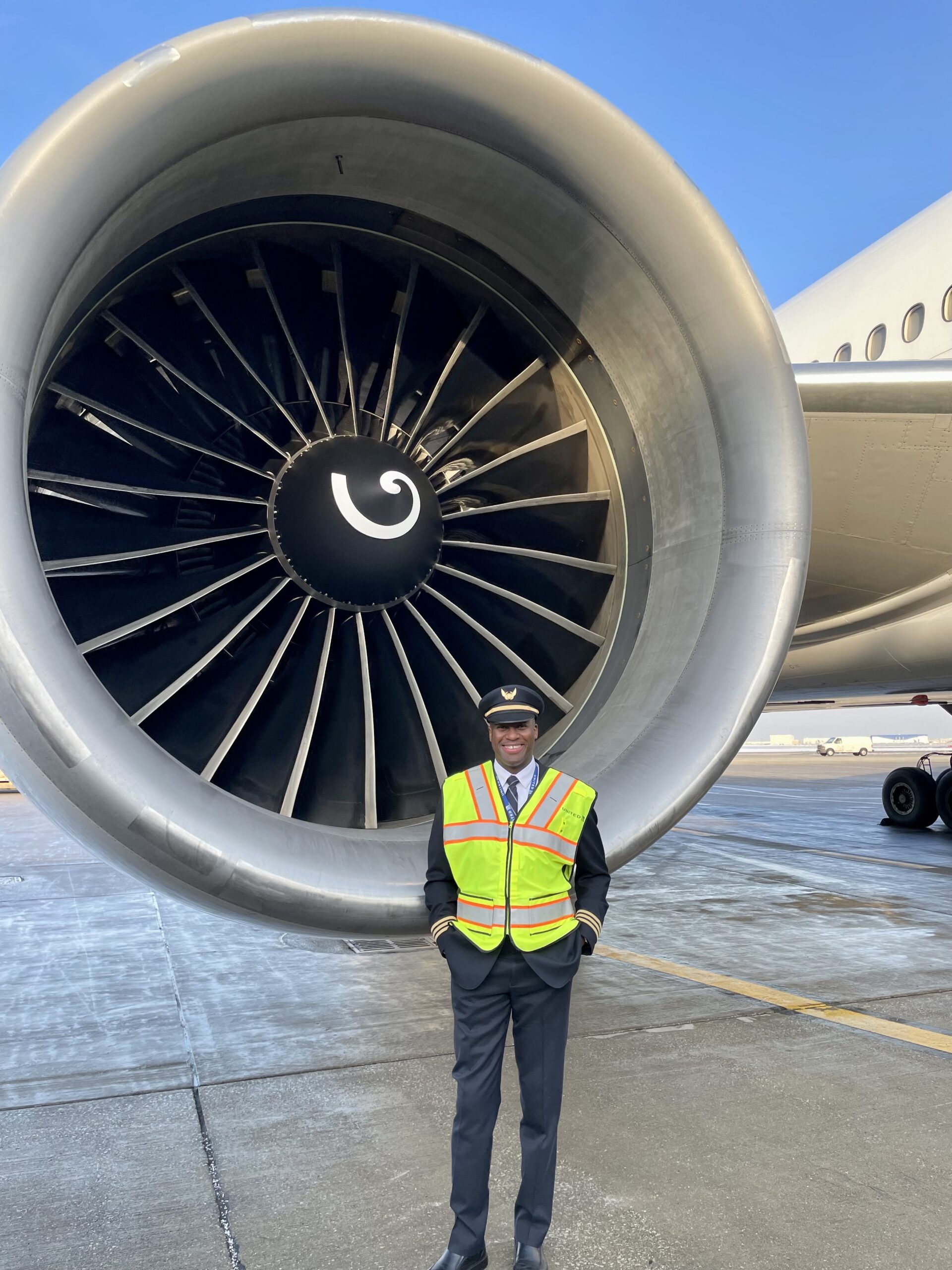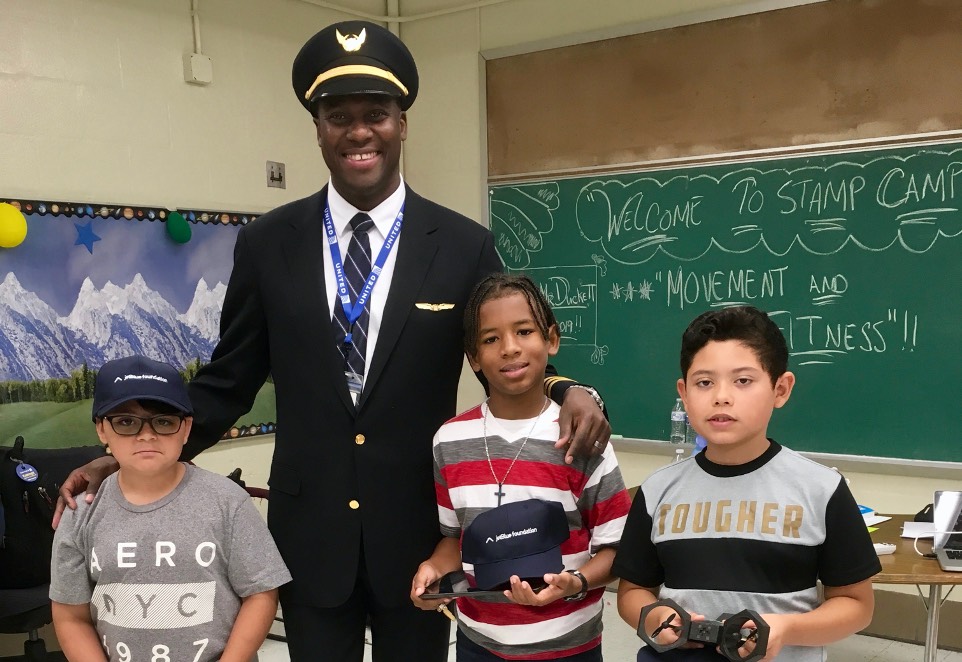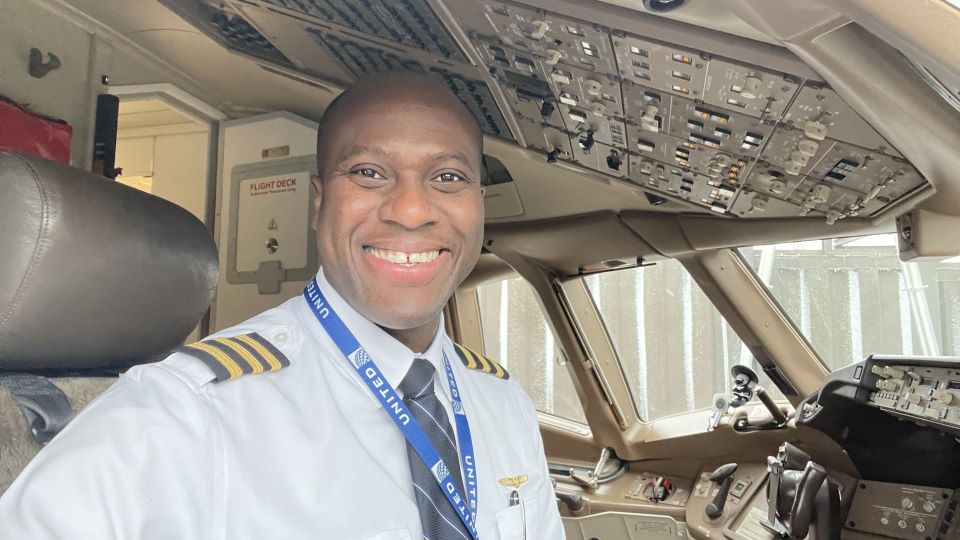Tennesse Garvey (’05) bears a name that tells a story. Part Tennessee Ernie Ford, part Marcus Garvey, his parents’ inspirations reflect both an appreciation for country music and a deep-rooted legacy of leadership. That duality—heritage and ambition—has shaped Garvey’s life, from his childhood in Jamaica watching aircraft approach Norman Manley Airport to his current role as a First Officer, B-777 at United Airlines, and Board Chair of the Organization of Black Aerospace Professionals (OBAP).

“Growing up, I didn’t know any pilots. There was no one coming to my school to talk about aviation,” Garvey recalled. “It wasn’t until my father got us a computer and internet access at home that I even learned about Embry-Riddle. That changed everything.”
From Kingston to Embry-Riddle
Garvey’s fascination with flight began at 6, standing in his family’s yard, watching the landing gear extend as planes descended for their approach into Norman Manley International Airport. But the dream nearly faltered during his first discovery flight at 12. “I nearly threw up,” he laughs. “For a moment, I thought, ‘Maybe aviation isn’t for me.’” But at his mother’s insistence, he made a second flight—this time in the calm morning air—and it was a happier experience.
“Growing up, I didn’t know any pilots. There was no one coming to my school to talk about aviation.”
Tennesse Garvey (’05)
Determined to pursue aviation, he applied to six universities, with Embry-Riddle as his top choice. Accepted into the Aeronautical Science program in 2001, Garvey’s education took an unexpected detour when the 9/11 attacks halted international students’ flight training. Forced to switch majors, he found a new interest in IT and aviation business, eventually earning minors in both before returning to Aeronautical Science.
He even dabbled in entrepreneurship. “I’ve always had an affinity for computers,” he explains. “In fact, I would build computers and sell them to students on campus. And anyone who knew they bought a ‘Tennessee computer,’ they knew they got a solid machine.”
He graduated in 2008, debt-free—thanks to working multiple jobs and securing scholarships.
“Embry-Riddle was gracious with scholarships, but I also worked nonstop,” Garvey says. “I was an ERAU Orientation Team Leader along with working on-campus in Worldwide Campus IT, and in the Financial Aid department. I also worked off-campus at the Daytona Beach Airport as a customer service agent for US Airways and at the YMCA. Whatever it took to stay in school and keep flying.”
A Career on the Flight Deck
After graduation, Garvey built flight hours as an instructor before becoming an assistant chief flight instructor at Florida Tech for their College of Aeronautics. He later joined JetBlue, then later United Airlines, where he now flies the Boeing 777 internationally.
“I bid my routes strategically. I love Japan, so I prioritize flights to Narita, but I also love Western Europe. It’s a balance—flying, OBAP work and family.”
Tennesse Garvey (’05)
“I bid my routes strategically,” he explains. “I love Japan, so I prioritize flights to Narita, but I also love Western Europe. It’s a balance—flying, OBAP work and family.”
His passion for mentorship never faded. Even as his career took off, he remained dedicated to helping others find their path in aviation.
Leadership in OBAP

Garvey did not discover OBAP until he was already working as a regional airline pilot. But once he did, he was all in.
“For me, it’s personal,” Garvey emphasizes. “I didn’t have a mentor coming up in this profession, so I know how hard it can be to find resources. I want to make that journey easier for the next generation.”
Under his leadership, OBAP has expanded outreach programs, including summer flight academies, scholarships, and partnerships with industry leaders. Last year alone, OBAP awarded over $1.1 million in scholarships, while its mentorship initiatives continue to change lives.
“I tell students all the time—you don’t have to be an island,” Garvey says. “You don’t have to do this alone. There are people who want to help.”
Beyond mentorship, Garvey works in United’s Pilot Hiring department, ensuring the best talent finds a place in the industry. “We’re facing a pilot shortage,” he notes. “It’s not a talent issue. It’s an access issue. And at OBAP, we’re working to bridge that gap.”
The Future of Aviation
Despite challenges—including industry instability and institutions ending their diversity initiatives—Garvey remains optimistic.
His greatest pride comes from seeing mentees succeed, including two young women he mentored through OBAP’s summer academies who are now Embry-Riddle students. “They started with us at 14, and now they’re on their way,” he says. “Their exposure to aviation began at an OBAP Aerospace Career Education (ACE) Academy, and every summer they kept coming back. Now they’ve been accepted to my alma mater, and I get to nominate them for the alumni scholarship. That’s incredibly special to me.”
“Being involved in OBAP was a no-brainer. I wanted to do school visits, talk to students about my career, and help guide them.”
Tennesse Garvey (’05)
This deep sense of purpose is what fuels Garvey’s dedication to OBAP. “Being involved in OBAP was a no-brainer,” he says. “I wanted to do school visits, talk to students about my career, and help guide them. There’s nothing like spending time with someone who’s considering aviation and showing them it’s possible. Growing up, I didn’t have that. If I can help someone make their journey a little easier, then it’s worth it.”
Looking ahead, Garvey sees his future extending beyond the flight deck. “I love flying, but I’m also passionate about leadership,” he admits. “Aviation management, shaping policy—there’s more work to be done.”
Until then, he continues to lead by example, serving as the mentor he would have liked to have himself. For him, that relationship is not just about networking and making connections. “Mentors let you see the potential you might not even see in yourself.”
His advice to students is to focus on the possibilities. “Ignore the noise that you might hear and know that if I can do it, and there are so many that have done it, you can do it too,” he says. “My big thing is just encouraging others: Don’t give up on your dream.”
